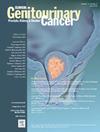老年膀胱癌患者类风湿关节炎、虚弱状态和死亡率之间的关系
IF 2.7
3区 医学
Q3 ONCOLOGY
引用次数: 0
摘要
背景:评估老年膀胱癌患者类风湿关节炎(RA)、全因(ACM)和癌症特异性死亡率(CSM)之间的相关性,并研究虚弱如何影响这些相关性。方法:回顾性队列研究来源于监测流行病学和最终结果(SEER)癌症登记处,并与医疗保险索赔数据(SEER-Medicare)相关联。该队列包括2004年至2017年间诊断为膀胱癌的≥65岁患者。使用经过验证的管理算法推导RA和衰弱状态。ACM和CSM源自SEER注册中心。结果:虚弱改变了RA和死亡率结局之间的关系(ACM的相互作用P值为0.002,CSM的相互作用P值为0.007)。我们观察到,在非虚弱患者中,RA与CSM (aHR 1.17, 95% CI, 1.01-1.35)和ACM (aHR 1.12, 95% CI, 1.05-1.20)的高风险相关。在虚弱的膀胱癌患者中,RA与CSM (aHR 0.81, 95% CI, 0.62-1.06)或ACM (aHR 0.93, 95% CI, 0.83-1.05)没有独立相关性。结论:虚弱与不良健康结果相关。随着人们寿命的延长,它在慢性疾病(如类风湿性关节炎)患者中变得越来越普遍。我们观察到RA与膀胱癌非体弱老年人发生ACM和CSM的风险增加有关。在虚弱的RA患者中,RA和死亡率之间缺乏相关性,这表明虚弱对死亡率的影响可能超过RA可能发挥的作用——这一信息有助于预测膀胱癌、RA和虚弱患者的预后。本文章由计算机程序翻译,如有差异,请以英文原文为准。
Association Between Rheumatoid Arthritis, Frailty Status, and Mortality in Older Adults with Bladder Cancer
Background
To evaluate the associations between rheumatoid arthritis (RA) and all-cause (ACM) and cancer-Specific mortality (CSM) in older adults with bladder cancer and examine how frailty may affect these associations.
Methods
Retrospective cohort study derived from the Surveillance Epidemiology and End Results (SEER) cancer registry and linked to Medicare claims data (SEER-Medicare). The cohort consisted of patients ≥ 65 years diagnosed with bladder cancer between 2004 and 2017. RA and frailty status were derived using validated administrative algorithms. ACM and CSM as derived from the SEER registry.
Results
Frailty modified the relationship between RA and mortality outcomes (interaction P value for ACM: .002 and for CSM: .007). We observed that RA was associated with a higher risk of CSM (aHR 1.17, 95% CI, 1.01-1.35) and ACM (aHR 1.12, 95% CI, 1.05-1.20) in nonfrail patients. In frail patients with bladder cancer, RA was not independently associated with CSM (aHR 0.81, 95% CI, 0.62-1.06) or ACM (aHR 0.93, 95% CI, 0.83-1.05).
Conclusion
Frailty is associated with adverse health outcomes. As people are living longer, it is becoming increasingly prevalent among patients with chronic conditions such as RA. We observed that RA is associated with increased risk of ACM and CSM among nonfrail older adults with bladder cancer. The lack of an association between RA and mortality in frail patients with RA suggests that the effect of frailty on mortality may overpower the effect that RA may exert—this information can help prognosticate outcomes in patients with bladder cancer, RA, and frailty.
求助全文
通过发布文献求助,成功后即可免费获取论文全文。
去求助
来源期刊

Clinical genitourinary cancer
医学-泌尿学与肾脏学
CiteScore
5.20
自引率
6.20%
发文量
201
审稿时长
54 days
期刊介绍:
Clinical Genitourinary Cancer is a peer-reviewed journal that publishes original articles describing various aspects of clinical and translational research in genitourinary cancers. Clinical Genitourinary Cancer is devoted to articles on detection, diagnosis, prevention, and treatment of genitourinary cancers. The main emphasis is on recent scientific developments in all areas related to genitourinary malignancies. Specific areas of interest include clinical research and mechanistic approaches; drug sensitivity and resistance; gene and antisense therapy; pathology, markers, and prognostic indicators; chemoprevention strategies; multimodality therapy; and integration of various approaches.
 求助内容:
求助内容: 应助结果提醒方式:
应助结果提醒方式:


